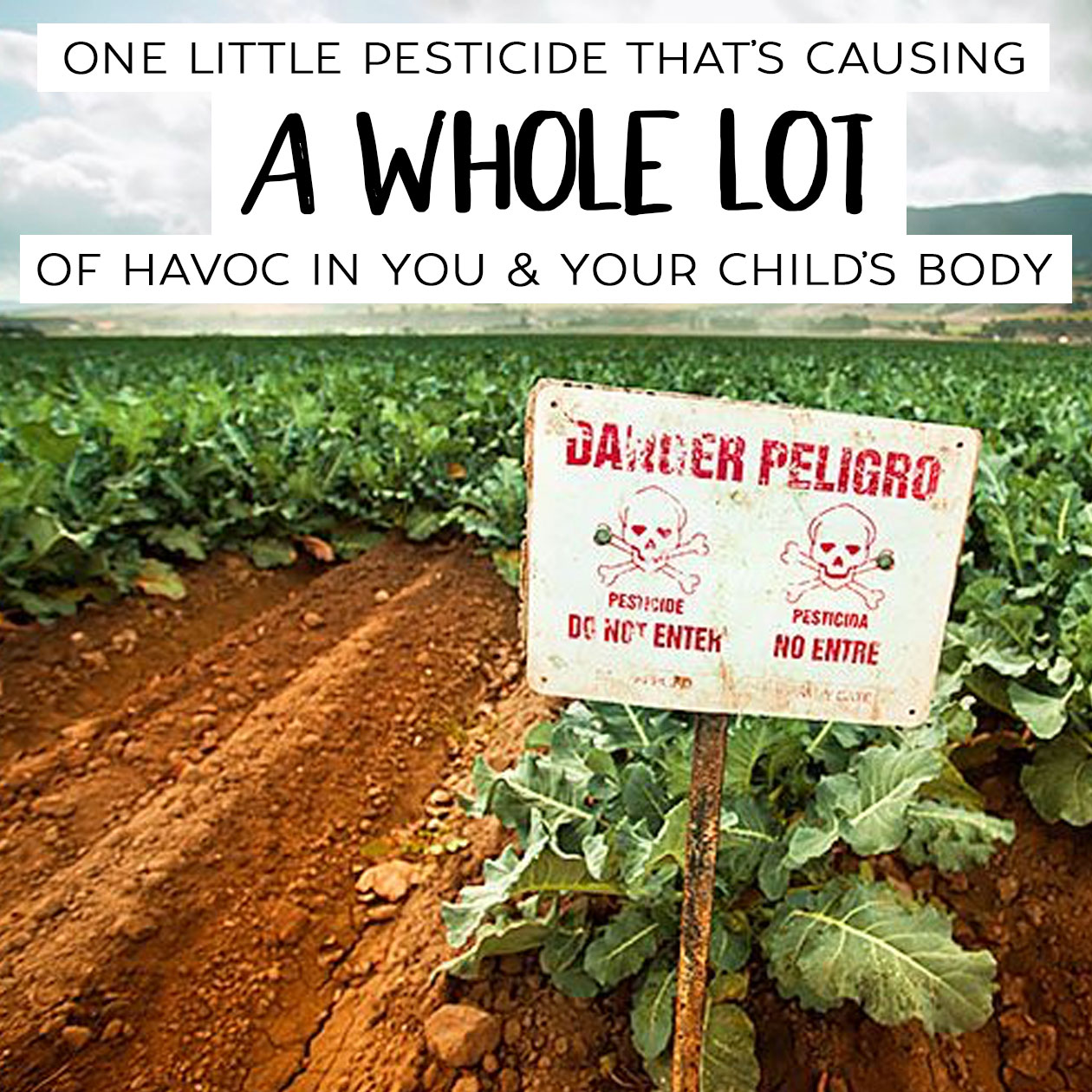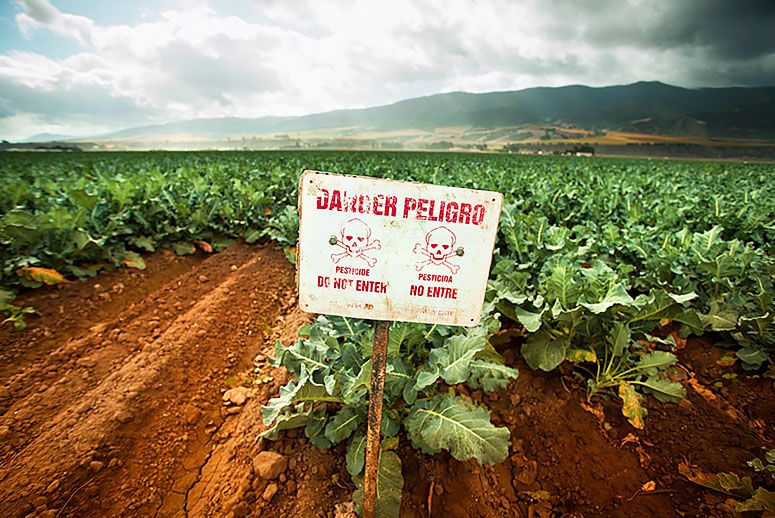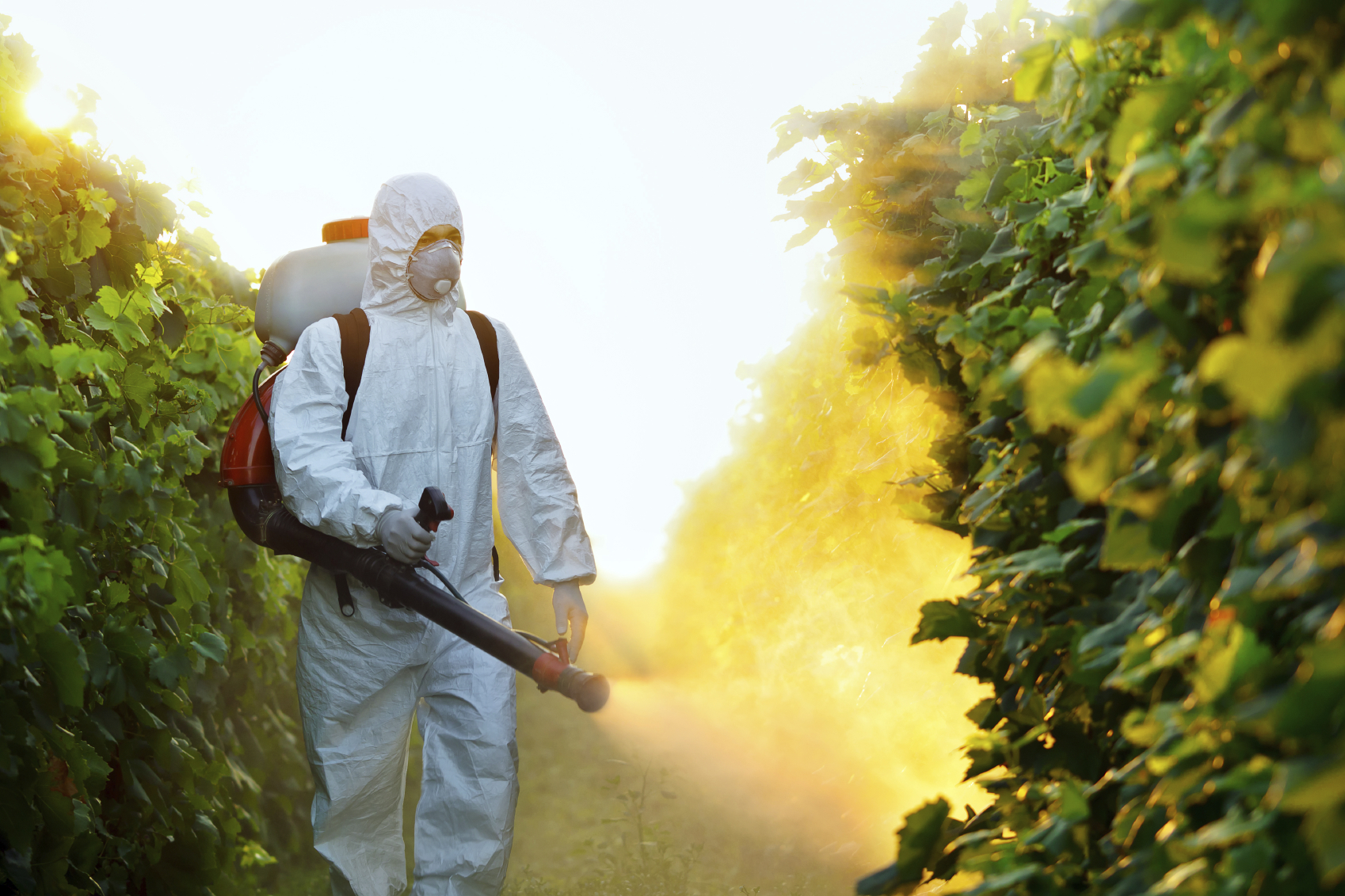
One little pesticide that’s causing a whole lot of havoc in you & your child’s body!
Something that really ticks us right off?
Pesticides!
You could say they’re the joker to our batman… or maybe the Lex Luthor to our Superman? But the short of it is, they’re really bad news.
Now we’re guessing that the fact that you’re reading this post means you likely agree… or at least know enough about them to question their motives… either way… you’ll want to keep reading!

A super-quick 101 in Pesticides…
Pesticides are used to destroy weeds, pests, speed up the ripening process & finally, to make sure the produce looks appealing on the shelf.
Conventional produce is sprayed with Pesticides anywhere between 10 to over 40 times before it hits the store shelf.
We spend billions of dollars on the ‘crop protection industry’ – as it likes to be called – every year.
And as demand for ‘perfect’ looking – yet cheap – produce that’s pleasing to the eyes increases, so will the use of pesticides.
But here’s that kind-of-extremely-important thing that they fail to tell us – many pesticides are actually known carcinogens, meaning they cause cancer, while others are known to promote tumour growth.
But unfortunately for us – that’s not even the half of it.
Many studies have shown the adverse health affects of consuming pesticides… this one always blows our mind:
A study out of Hawaii showed that men who drank two glasses of milk a day contaminated by pesticides had 40% fewer brain cells in the substantia nigra region (the part of the brain that’s important for movement) which is a sign of Parkinson’s disease.

Pretty scary isn’t it?
But today we actually want to talk about 1 pesticide in particular (oh yes – there are many different pesticides out there!)…
Let us introduce you to…
Organophosphate Pesticides
…even the name is kind of menacing isn’t it?
Organophosphate Pesticides – AKA OP – first came about after WWII – when the USA realised that nerve agents developed in Germany turned out to be really good at killing insects.
To answer your next question… Nerve agents are nasty compounds designed to attack the nervous system in order to prevent it from sending messages around the body to your organs & muscles. That’s how they kill insects…
So in a nutshell – this pesticide originated from chemical weapons designed to harm & kill people! Just think about that for a second… I mean REALLY think about it… Insane, yes?

Even though there’s been a heap of super scary research regarding OP’s & it’s negative affects on your body – it’s still widely used.
In fact, the Centre for Disease Control & Prevention has an entire list of health issues that can occur as a result of exposure to OPs.
These include headaches, nausea, vomiting, convulsions, loss of consciousness & a whole host more…you can check out the rest out here.
Think that’s scary? Unfortunately it gets worse. Especially for kids.
Children are at a greater risk than adults because their bodies & organs are still developing & as a result, their detoxification organs (liver & kidneys) are not able to remove the OP residues.
– In a study in the US, 96 kids were tested for pesticide exposure & 95 of them showed traces of Organophosphate pesticides.
– In 2013 more than 20 primary school children in India died after eating a meal containing dangerously high levels of Organophosphate Pesticides.
– Another study showed that when pregnant women were exposed to OPs the chemicals can actually penetrate the placental & blood brain barrier of the human foetus, exposing the unborn child to toxins.
Pretty scary shiz hey?

So let’s talk about solutions.
Well… let’s jump back to that study we just mentioned… where out of 96 children screened for pesticide exposure, all of them showed traces in them but 1. The parents of that of 1 child ate organic food exclusively & did not use any pesticides around the house.
Another study showed that an organic diet significantly lowered children’s exposure to Organophosphorus pesticides. We say “lowered” their exposure & not wiped out completely because unfortunately food is not the only source of exposure. Buildings, parks & sporting fields are often sprayed with pesticide as well. This stuff is literally everywhere!
Now while there are multiple forms of exposure… diet is the one thing you have complete control over – eating organic foods really is that important!
A great way to bring more organic food into your diet is by growing your own.
Even if you have very little space – a few herbs & leafy greens (which are very easy to grow & can all be “smooshed” in together) go a long way.

Plus growing your own can help mitigate the cost of buying organic.
But when you do buy – rather than looking at it as an expense – try to look at it as an investment in your health & the health of your kids… because if you’re not eating organic chances are you are exposing yourself to some very nasty chemicals.
The way we see it…you’re better off paying a little more now that paying big time down the road!
So just to recap – eating Organic food is just so important to your health – we can’t stress it enough!
In the coming weeks we’ll be digging into the dangers of pesticides a little more + the different affects it can have on your body… so stay tuned for that!
In the meantime, if you have any Q’s at all pop them in the comments below or shoot us through an email!
Speak soon!
Anth & Crystal
P.S Think someone you know might benefit from this?? We would LOVE for you to share it around!! xx
References
https://www.ncbi.nlm.nih.gov/pubmed/9498903
http://www.whatsonmyfood.org/index.jsp
https://emergency.cdc.gov/agent/nerve/tsd.asp
http://americannutritionassociation.org/newsletter/pesticides-exposure-among-preschool-children
https://www.ncbi.nlm.nih.gov/pmc/articles/PMC1513324/
http://www.ewg.org/research/body-burden-pollution-newborns
http://pediatrics.aappublications.org/content/early/2012/11/21/peds.2012-2757
http://iitc.org/wp-content/uploads/2013/07/E-Guillette-Rio-Yaqui-Children-Study-1-wdrawings.pdf
http://www.panna.org/publication/generation-in-jeopardy
https://www.ncbi.nlm.nih.gov/pmc/articles/PMC1241687/pdf/ehp0111-001640.pdf








Leave a Comment